Outer Wilds and the Concept of ‘Going in Blind’
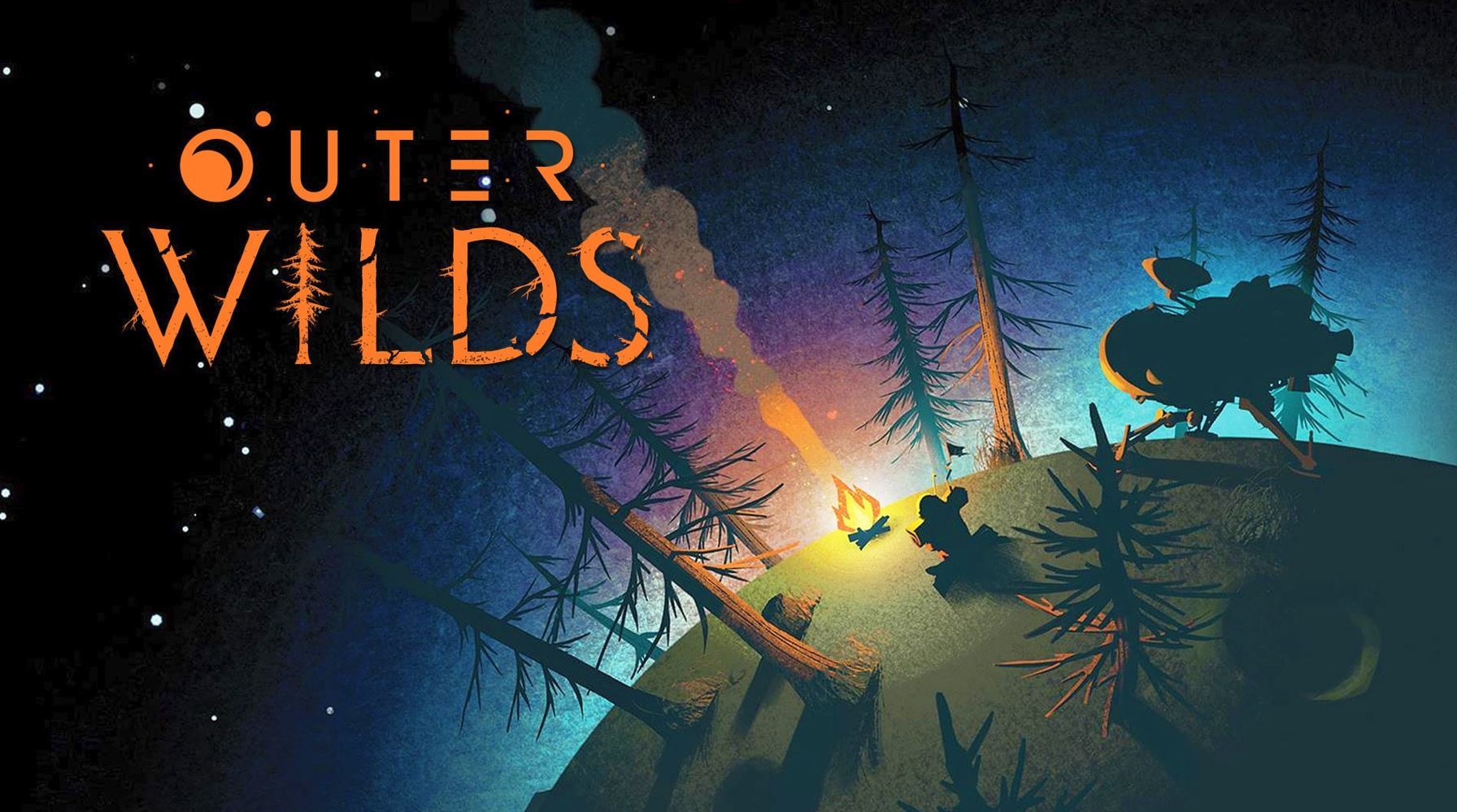
Don’t look anything up before you play it. Don’t google anything, don’t read the reviews too much, don’t even watch the trailer if you can avoid it – just buy it, download it, and go in blind.
That’s the suggestion that many people will get when told they should play science fiction game Outer Wilds (2019). Most people, when hyping up a beloved piece of media to their friends, will talk about it and their favorite moments or characters extensively. But fans of Outer Wilds will often do just the opposite.
They may give a brief explanation of it, saying that it’s science fiction, that you explore space, and there’s really good music, but beyond that it’ll likely be vague.
And in turn, many new players have, after playing the game, appreciated this vagueness. They’ve found going in blind, unspoiled, not really knowing what they’re getting into has improved their playing experience.
Of course, it could be said that this is the same for most media, that you’d be hard-pressed to find a game that was better after you’ve been spoiled for every plot point. But you’d also be hard-pressed to find a game for which spoilers are so locked down on that some players going in don’t even know the game’s central premise, where many reviews open by suggesting you go in without knowing too much or even read the review below. At times, it goes beyond traditional spoiler culture into something else.
So then why does it exist – and does this game really need such a culture around it?
Before this article begins in earnest, a warning: it will spoil the plot of Outer Wilds. If you want to go in blind, and discover just why it’s so crucial to do that by yourself, then do that. Otherwise, it will all be explained here.
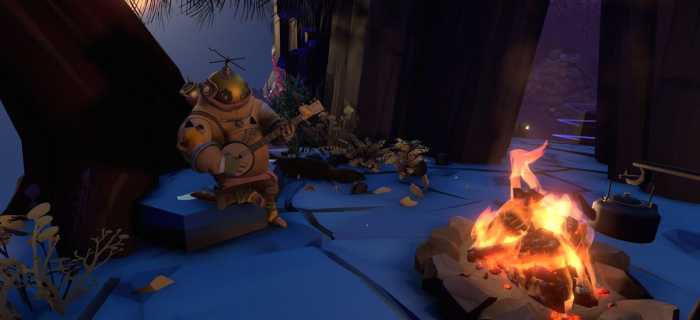
Spoiling Outer Wilds
Outer Wilds is a space exploration game. The player is from an alien race which has only recently developed space travel technology – and has just been given the chance to explore space. After a brief tutorial, they can go to their own spaceship, and take off into the stars.
There are a number of planets out there, and plenty of things to see. They can experience the natural wonder of each planet, visit their fellow space explorers, or explore the ruins created by a dead alien race.
Around 20 minutes into this adventure, the sun goes supernova. The player character dies, and their entire solar system destroyed.
The player character then wakes up, back where they were at the very beginning of the game. They seem to be the only person to remember what has happened, and to the player the will objective seem clear – figure out why the sun went supernova, and stop it.
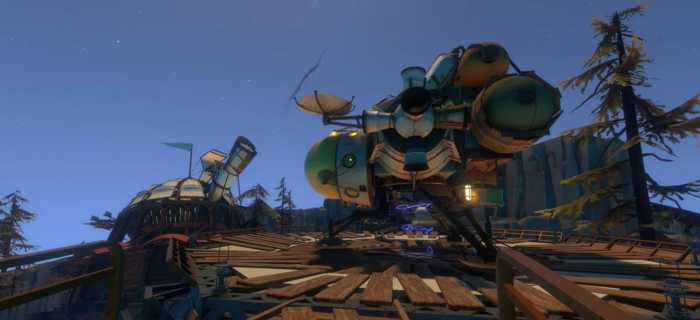
Over the course of the game, the player will be brought to every corner of the solar system to unravel this mystery. They will discover many secrets. Why they’re time looping. Where all the members of the dead alien race went. And of course, why the sun explodes.
But in this journey, the player will eventually discover that their initial assumption – that they will stop the sun from exploding – is wrong. All things must end, and that includes the sun. That includes the universe, and, sadly, everyone in it.
Instead, the game ends with the player ending the time loop. They watch the destruction of the old universe, and aid the new universe in being born.
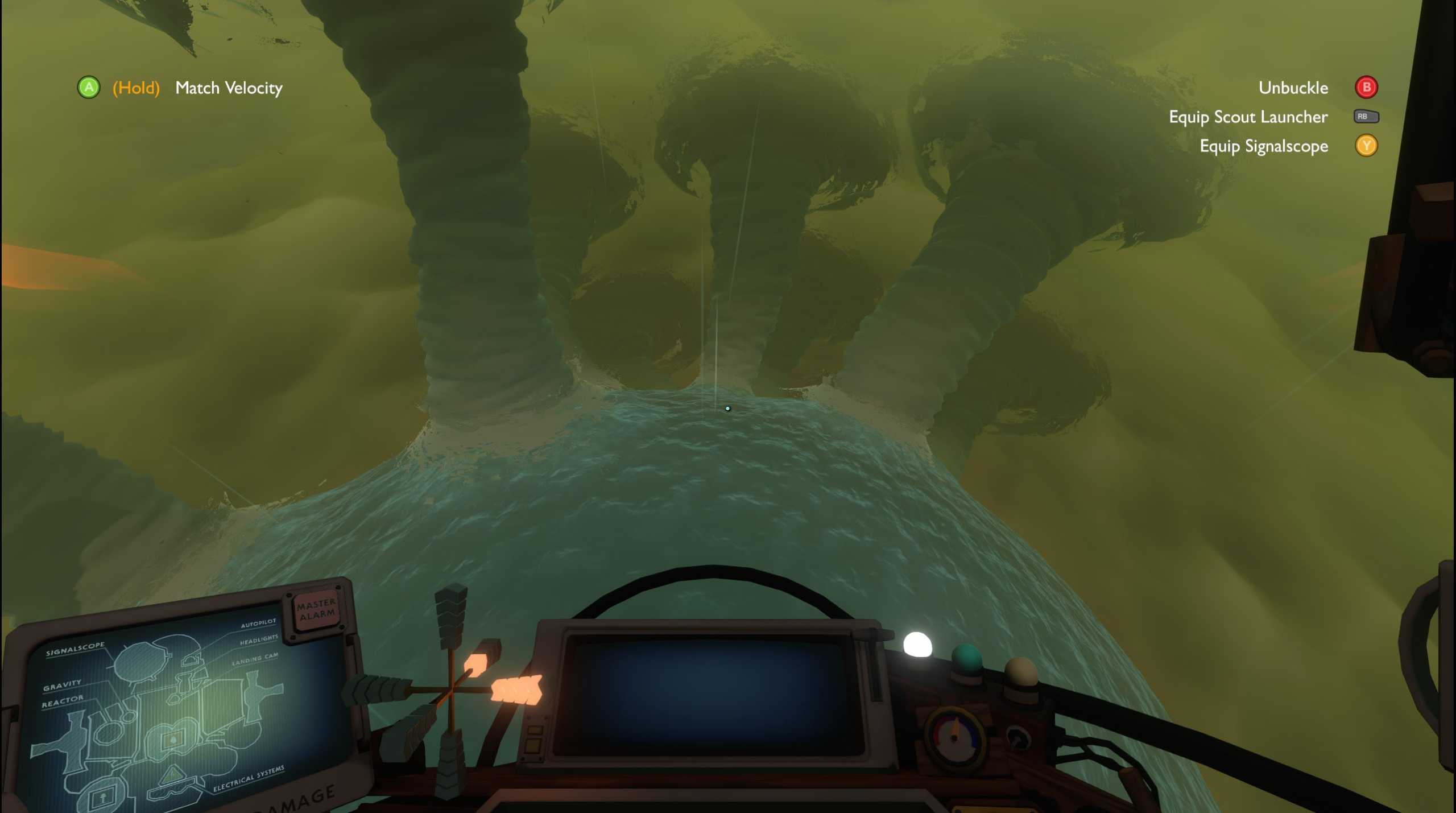
Playing Blind
This plot is a lot and can be quite emotive for many players, but there are plenty of science fiction stories with stories that are just – if not more – shocking and twisty. So then, why exactly is it so important to play this game in particular blind and completely unspoiled?
As with any story based around a secret (or a few), being spoiled for the central mystery can of course defeat the purpose of the entire game. When half of the tension is based around not knowing something, finding clues and slowly piecing it together bit by bit, knowing the final solution can easily take the player out of it. They might not find a mystery quite so compelling if it’s already been answered.
This is the argument generally posed against spoilers for all stories including a central mystery, no matter their medium, but it can be argued that for an exploration game like Outer Wilds it’s even more important – as it’s been constructed in a somewhat nonlinear fashion.
In a book or film, the central mystery will be unravelled by the characters in a precise order. While some readers may pick up on certain clues and figure out all the answers faster than others, they’ll still do so in roughly the same order. Books and films are a static medium, and while different viewers may get slightly different things out of the same story, their progressions of understanding the mystery or order of events will be relatively similar.
That’s not really the case with a game like Outer Wilds; solving the central mystery of your time-loop and sun explosion is a very different matter.
Exploration is one of the strengths of Outer Wilds. The moment you receive your spaceship, you can go anywhere you want. It’s a wide world, and while there are some suggestions, there’s nothing that you have to do in particular. As such plenty of players act in the moment, doing whatever tickles their personal fancy.
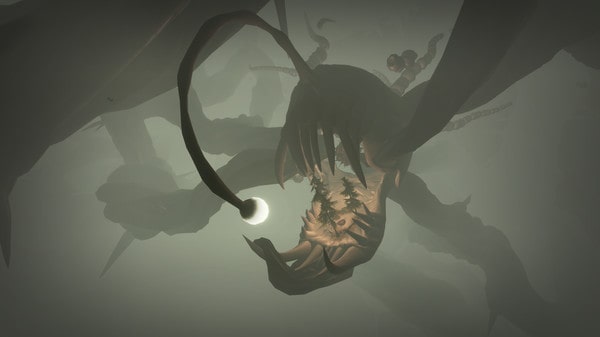
What all of this means is that there is no one set experience of Outer Wilds; each time a new person plays it for the first time, their journey will be unique and customized to their tastes.
There’s no set order to where you have to go, so different players will find different clues, different pieces of the mystery, in a different order. When you only have a part of the puzzle, it alters your perspective and understanding of it, so players can have wildly different assumptions based on what exact journey they took.
In addition, it’s possible to finish the game without finding out every last secret – there’s even a character it’s possible to never encounter, changing the ending slightly.
All of this adds up to creating a unique experience for each player. As such, spoilers aren’t at just at risk of ruining an enjoyment of a story by revealing the central meaning. They also destroy this unique road to understanding.
And of course, there’s also the fact that with other ‘static’ types of media like books generally do not necessarily require the reader to figure anything on their own. You can if you want to, but it’s not essential, and having that ‘aha’ moment won’t effect the actions of the characters as it will in a video game. As such, spoilers can also ruin that feeling of self-discovery, of piecing together the mystery and solving things on your own.
It’s this unique journey of discovery that many fans wish to preserve for new players.
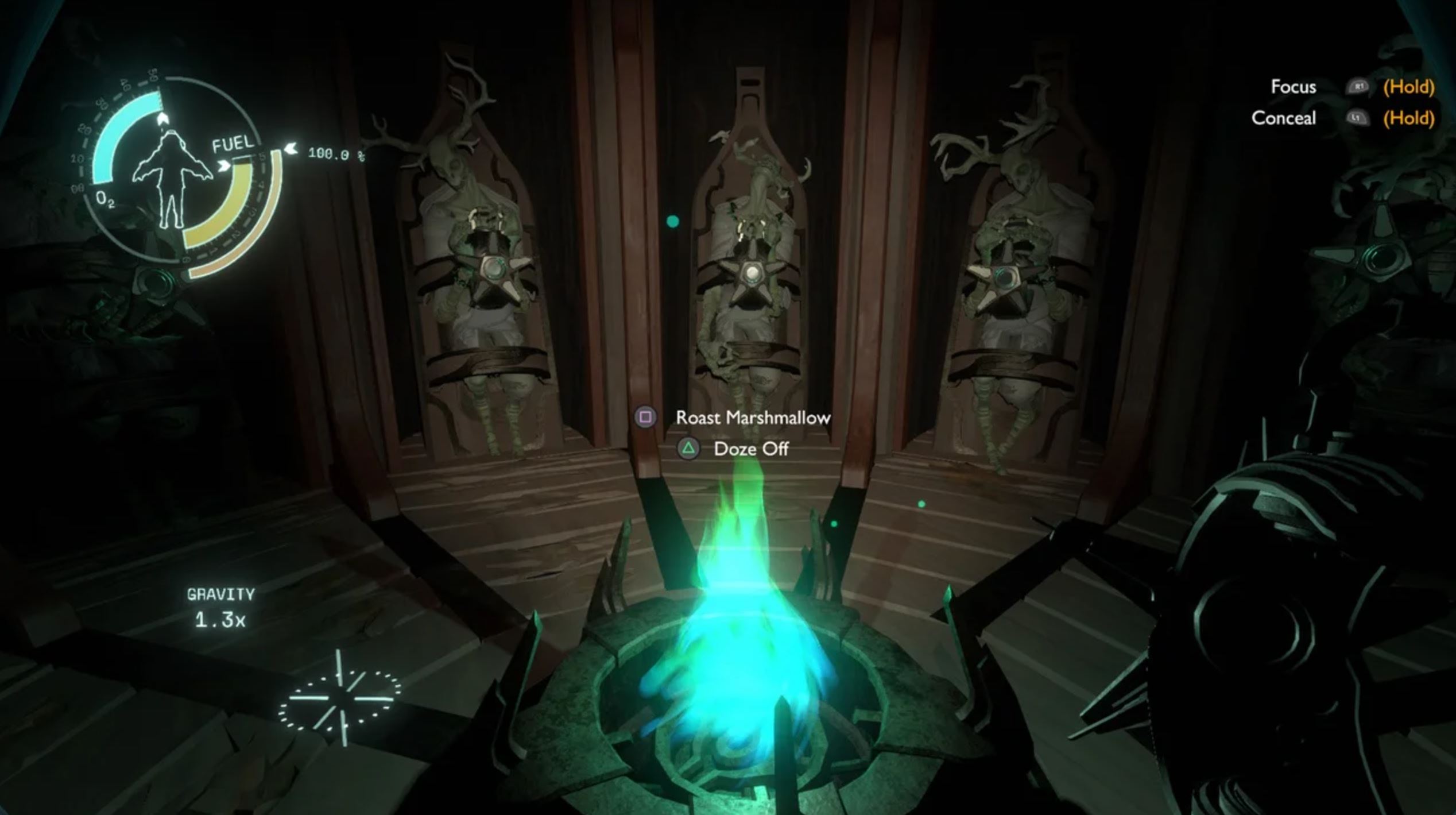
What the Research Says
All of this, however, is just the feeling of players, their personal reasons for wanting to hide spoilers and encourage new players to go in blind. And it can be quite hard to be objective about one’s feelings.
Spoilers and the effect they have on a person’s enjoyment is a subject that has been studied extensively. However, research has at times shown inconclusive results as to whether spoilers really do completely ‘ruin’ enjoyment. As such, some researchers believe that the effect depends on certain factors such as the nature of the media, the person viewing it, and why they’re viewing it.
In J. E. Rosenbaum and B. K. Johnson’s article Who’s afraid of spoilers? Need for cognition, need for affect, and narrative selection and enjoyment (2016), they hypothesized that a person’s reaction to spoilers depended on what they were trying to get out of the piece of media.
They believed it was around the need for cognition – how much thought and mental energy you want to put into consuming the piece of media. If you’re not looking to put much thought into the media (say, if you’re wanting to watch a comedy movie to laugh at the jokes), being spoiled might not effect you as much as if you’re wanting to put a lot of thought and brainpower into it (say, if you’re wanting to watch a murder mystery and figure out the murderer before the protagonist does).
It’s worth noting that the conclusions to this article was based on studying reactions to TV shows and movies. Little to no formal research has been done on video games specifically.
This is crucial, as the medium of a work can effect how spoilers are received. In T. A. Daniel and J. S. Katz’s article Spoilers Affect the Enjoyment of Television Episodes but Not Short Stories (2018), they found that while spoilers could have a negative effect on how viewers enjoyed episodes of a TV show, they didn’t effect people’s enjoyment of short stories. A few possible explanations were given to why, but it seems likely that the different lengths of the media were a factor. A TV show is much longer than a short story, after all.
As such, it seems likely that spoilers for video games would work in a similar manner, with spoilers having a different effect on longer games than shorter ones. However, this wouldn’t be a one-to-one scale with video games, as many very long video games focus more on mechanics than story. If people are playing a game for the joy of playing it, and the story is simply set dressing and not considered important by players, being spoiled might not be quite as bad. This, however, is not the case with Outer Wilds, as although the mechanics may be fun, most players pick it up for the story and exploration elements.
Given the length of Outer Wilds (over 20 hours, though the exact length can differ between players), it seems likely that similar to movies and long-form TV shows, being spoiled would genuinely have a profound negative effect. Given its topic, central mystery, and focus on self-guided exploration, players are likely to have a high need for cognition while playing the game, once again making spoilers unwanted to say the least.
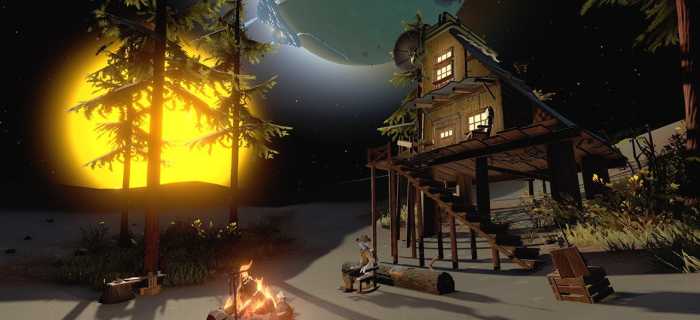
There is some evidence to show that people can and do overestimate the effect of spoilers on the enjoyment, however. This is the hypothesis in D. F. Yan and A. S. L. Tsang’s article The misforecasted spoiler effect: Underlying mechanism and boundary conditions (2016). This found that while many people believe spoilers will have a huge negative effect on their enjoyment, they often won’t be effected as much as they think.
However, they also found that the participants in their study could under-predict the effect a spoiler could have on their enjoyment – namely, when the spoiler revealed the process of a plot. It could be argued that many of the spoilers that Outer Wilds fans are trying to avoid fit into this category, but probably not all of them.
There are even those that argue that spoilers can have a positive effect, with the right piece of media in the right genre. It’s similar to the effect re-watching or re-playing something can have – when you know how something ends, you’re better able to notice foreshadowing, and will enjoy it in a slightly different way.
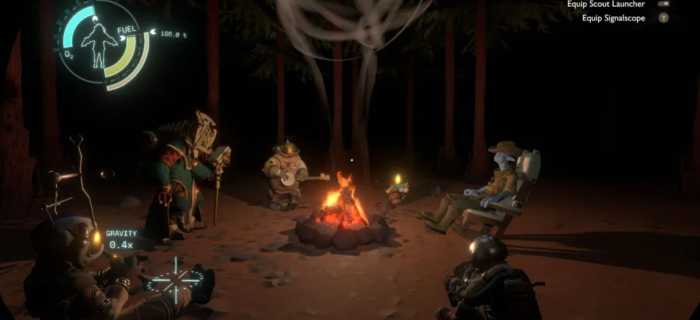
In B. K. Johnson and J. E. Rosenbaum’s article (Don’t) tell me how it ends: Spoilers, enjoyment, and involvement in television and film (2017) they found that spoiling a fantasy/thriller film could increase enjoyment, though they noted their data wasn’t of statistical significance. It could be argued that for some players, encountering minor spoilers could have this effect, and improve their playing experience. But it’s hard to know how far is too far, or what will work better for each individual.
Regardless, it seems clear that while it’s possible that Outer Wilds fans are overestimating the amount that spoilers can ruin a player’s experience, they can definitely have a real and tangible negative effect on enjoyment.
As such, if you’re looking to enjoy this game to the best of your ability, it does seem that going in completely blind could indeed be the right choice.
It also seems, however, that knowing a few plot details won’t completely ruin it, and might even make some parts more enjoyable. So if you know a few spoilers – like the ones shared in this article – it’s still worthwhile giving the game a try.
This culture around going in blind is understandable, and it can help some people enjoy the game more, but it’s by no means essential. And spoilers are no reason not to enjoy something.
What do you think? Leave a comment.











An excellent game which often bobbed up into the outstanding zone for me, with some genius aspects.
I feel like I’m a pretty adaptable gamer but I felt like at least two of the planets were outright badly-designed at junctures: the black hole-cored one and the stealth fish one. Orientation and pathfinding felt a nightmare in bits of the former; and trying to gauge what the parameters for getting munched on seemed too ambiguously trial and error in the latter.
Both planets were conceptually great and very cool apart from those bits though. And didn’t have any big issue with the others. Figured out about 90% of the game myself, including lots of ecstatic epiphanies!
I can tell this game is amazing, i can see the effort talent creativity put into it, I want to see more… and just can’t.
In 30 years of gaming nothing has given me a sense of existential dread like this game. It is almost impossible to explain but as soon as that ship takes off I am just scared shitless of absolutely everything. I know it’s a game, I know I am not really floating through a void of endless death, I know I can die and respawn and that is the point, I am totally fine with all of that.
When I’m not playing I think what am I stressed out about, there really is nothing to fear. and then I turn it on and plunging into the deep (a metaphorical blue ball of all my horrors rendered in a web of dread) causes me to freak out and reverse and close the game.
Makes zero sense…
Perhaps the epilogue of The Last of Us Part II could rival that feeling of existential dread…
I might give this one a try myself if i can prise myself away from Crusader Kings III for a few hours.
Great article. I am a 52 year old man but I have zero interest in games. Something drew me to the article. It was deep and a pleasure to read. Thank you for writing it.
There is an enormous range of games now, and what floats someone else’s boat might be totally uninteresting to you. I don’t play hairtrigger shooters and tend to avoid combat in general. yet I still have a ton of games I enjoy. check it out! good luck and have fun!
There were some parts of the game later on that I felt were quite frustrating. One bit on the sand planet in particular stands out, where you had to wait a while and then do a difficult move (and if you missed you had to wait to try it again). Learning the “meditate” skill should have been much easier to do, too.
It’s a shame that it’s not a little more accessible overall as I really do think it’s a fantastic game and I found the ending very emotional (and not what I was expecting at all). It was such a nicely sized world to explore, enough to reward curiosity, not so much as to be overwhelming.
In the era when it seems almost every game has RPG or metroidvania elements, it was lovely to play a game where you only ever “upgraded” from knowledge.
One of the best games of the generation. The ingenious design, the excellent music and the way its used, the sense of scale and awe achieved despite the small size of the solar system, the incredibly atmospheric parts, the delivery of a compelling narrative in a non-linear way, the way the mechanics and themes of the game support each other.
It’s a truly incredible, beautiful game.
Exploration is the only reason I’m a gamer.
You forgot to mention how genuinely terrifying this game can be! 😀
Man, I love time loops. I especially love how there are so many different potential responses to time loops. Exploring every possible location searching for a way to stop the time loop, only to realize you can’t… that’s fun.
I hope this come to Nintendo Switch soon, I’ve been dying to play it.
One of the best experiences I’ve had in all my years of playing games, all the way back to the old Spectrum (marred only slightly by the latter half of the DLC which was an absolute ballache). I played Outer Wilds and Return of the Obra Dinn one after the other. I forget in which order, but at the end of the first one I was bereft, thinking that it’d be decades before I played a game I loved so much again. Then along came the other. In fact, if you bounced off the flight mechanics in Outer Wilds, I’d recommend Obra Dinn — same sleuthing satisfaction with 100% spaceship crashes.
That said, mastering that bastard ship was part of the ramshackle joy of Outer Wilds. Not that I ever managed to do so. My method of travel was to hurl myself at the next planet as quickly as possible then hit the brakes and hope that the damage when I slapped into the surface wasn’t so catastrophic that I could repair it. Seemed to fit the freewheeling nature of the rest of the game.
I’m in my mid 40s and can’t imagine not having gaming in my life. From Amiga 2600 to Megadrive, PS2 and now XBox, gaming has been my destresser. I could not have got through lockdown without Red Dead Redemption 2 or a Far Cry allowing me to escape to another place, and just wander around. I think it’s fab cross-generational gaming. Sadly not something that will happen for me, but so many people dismiss the benefits of gaming for mental health. But y’know, hours reading or knitting or boxset binging is fine…
I wanted to play Outer Wilds badly – but I very easily get vertigo in 3D games, and ending up fealing sea sick after a few minutes in game ….
I find the Outer Wilds absolutely maddening rather than intriguing. By the time the universe explodes I’m quite glad.
I gave up on the Outer Wilds after about an hour. Far too fiddly. I don’t care how good everyone claims it’s supposed to be I can’t be arsed with it.
I think Outer Wilds is one of the most overrated games I have ever played. It failed to click with me and I went back to No Man’s Sky.
I didn’t ‘get it at all either and I found it incredibly dull. Not disputing that many people might love this type of game, but it’s not for me.
Glad to know I’m not alone! I found the spaceship uncontrollable and didn’t understand what the game wanted me to do. I felt a bit bad about not enjoying it because it came so highly rated.
Outer wilds provided a bit or narrative driven therapy to 100’s of hours (decades in different versions) earning a ship that could fly to sagittarius and back etc…
The beauty of No Man’s Sky is you don’t have to go anywhere. Its worth playing until you find a nice planet with an atmosphere that doesn’t dissolve your suit but once you do you can mine and build the whole place if you like and put down some roots.
I think the last straw for me with the Outer Wilds was when my ship started spinning and before I managed to get it under control I started feeling queasy and had to stop before it got worse.
There are very few games that have done that to me in all my years of gaming, but this was the most recent.
I abandoned this game when it became clear there was no save game feature.
It absolutely has a save game feature. No idea at all what you’re getting at there.
The game autosaves, in a sense.
Dying before you’re shown how is unfortunate, and probably not intended, and one of the risks of a game that has so little hand-holding.
MILD SPOILERS: If it helps, everything in the “tutorial area” is skippable. You only need to enter the museum, talk to the curator, and leave. From that point onwards, you will never be required to speak to anyone in the village ever again. After this point it becomes obvious why a manual save isn’t needed.
Some games are just magic and can create wonderful memories. This is one of them.
Neat article. I appreciated your wrangling with the research behind spoilers and whether they do, in fact, spoil people’s experiences of media. I can personally attest that sometimes knowing that some cool moment or scene is coming up in a game or movie can be really beneficial to my enjoyment – building up my anticipation.
Re: Outer Wilds, yes, going in blind does lead to the best experience because, as you said, it leads to being able to speculate and guess and come up with theories that can later be proven wrong. So, for instance When the sun explodes, if you aren’t able to see it, you just die and I’ve seen many blind playthroughs where people come up with all sorts of fun ideas for why they are dying and only later realize ‘oh, the sun.’
But I do agree that some things in this game can be spoilered. The Time Loop, the supernova, even the nature of some of the planets for instance. I’ve known people who felt really daunted by the idea of space exploration who have been relieved to know that the game resets every 22 minutes as that means that the amount they can explore is, by necessity, constrained.
But beyond those ‘premise’ spoilers, I think any deeper spoiler of the game actually ruins the experience, just like someone telling you how to solve a puzzle in a puzzle game takes away the joy of solving it on your own. If someone talks about how you can Climb inside a jellyfish well, now you know what to do when you see that in the game. If someone talks about how The tower of quantum knowledge is only reachable once its fallen through the black hole then… you know how to do that too. These are cool moments and cool revelations in the game, but they are also, in a sense, the entire point of the game.
If someone spoils you about The Flood in Halo (uh, spoilers, I guess?) then you still get the chance to fight them, even if you know they are coming. If someone spoils the solution to an OW problem… then your gameplay is significantly affected.
Anyways, thanks for the article! I enjoyed it.
My favourite is exiting the ship and immediately expiring because you forgot to put your space suit on.
My student-age daughter thinks the whole point of Uncharted is to get Nate to fall to his death in the most impressive way. It has to illicit the longest “Naaaaaaatttttttttteeee!” from the other characters…
It’s an absolutely wonderful game. The only downside for me is that once you’ve completed it, it has no replay value whatsoever, unless you like solving puzzles you’ve already solved.
Superb article. This may be the best game of all time. But it is hard AND beautiful.
I’m glad I waited to finish OW before being spoiled about it.
People are seriously over rating this game. There not much to it, no real goals or anything.
There are goals. It’s understanding the time loop and quantum physics so you can break the loop.
There is a surprising lack of games that are about accepting fate and that it cannot be changed.
This game is truly something else, a big, meaningful conversation with you, the player, your beliefs and your place in the world and so, so incredibly liberating from a thousand dumb shackles we impose on ourselves.
This is the new Myst.
This is nothing but a masterpiece.
Story, visuals, sound and the sense of dread while exploring is fantastic. That being said, the actual gameplay and controls are very mediocre, this combined with frustrating platforming/puzzles and time limit + timing requirement.
Imagine trying to read a really boring and badly written children’s book, except every paragraph is printed on pages that are scattered all over the place and its up to you to find them and put them back in order. That’s Outer Wilds.
This game is a hard 10. It’s the best game of the decade. Thanks for covering it.
Best game I’ve played in years.
The most criminally underrated game I’ve ever played. Do yourself a favour and don’t read up on it at all. A modern masterpiece in every sense of the word.
Really like the game but the really frustrating movement with the shuttle and with the jetpack really kills the game for me and I’m probably not the only one who feels that way
Prob just u man, it was really doing the job well in my playthrough.
It’s a learning curve, but once you figure it out, flying is fairly easy.
Great article! It’ll be interesting to see if someone actually does some research on spoilers and video games in the future. I think, as someone who really doesn’t like many spoilers, this article convinced me that some lighter spoilers is okay sometimes. Thank you for the nice read!
Some lighter spoilers can be okay but I DO love to go in blind with stuff a lot =D
I just finished Outer Wilds, and it was a remarkable experience. The commitment to letting players explore the world and discover things is extraordinary. The mechanics and world design really do fit the ideas the story is trying to capture/explore.